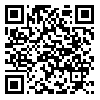BibTeX | RIS | EndNote | Medlars | ProCite | Reference Manager | RefWorks
Send citation to:
URL: http://irj.uswr.ac.ir/article-1-67-en.html
2- Rehabilitation Research Center, Iran University of Medical Science, Tehran, Iran.
3- Rehabilitation Research Center, Iran University of medical science, Tehran, Iran.
Objectives: The purpose of this study is to describe the experiences of adults with acquired blindness while performing the daily activities of normal life and to investigated the role of environmental factors in this process.
Methods: A qualitative phenomenological method has been designed for this study. A sample of 22 adults with acquired blindness who were blind for more than 5 years of life were purposefully selected and semi-structured in-depth interviews were conducted with them. The interviews were transcribed verbatim, coded and analyzed using van Manen’s method.
Results: The five clustered themes that emerged from the interviews included: 1) Products and technology-discusses the benefits and drawbacks of using advanced technology to promote independence, 2) Physical environment-“The streets are like an obstacle course”, 3) Support and relationships-refers to the assistance that blind people receive from family, friends, and society, 4) Attitudes-includes family and social attitudes toward blind people, 5) Services and policies-social security, supportive acts, economic factors, educational problems and providing services.
Discusion: Findings identify how the daily living activities of blind people are affected by environmental factors and what those factors are. The results will enable occupational therapists and other health care professionals who are involved with blind people to become more competent during assessment, counseling, teaching, giving support, or other interventions as needed to assist blind people. Recommendations for further research include more studies of this population to identify other challenges over time. This would facilitate long-term goals in the care. Studies that include more diversity in demographic characteristics would provide greater generalization. Some characteristics such as adolescent age group, married and single, ethnicity, and socioeconomic status are particularly important to target.
Received: 2010/02/7 | Accepted: 2010/03/2 | Published: 2010/04/1





